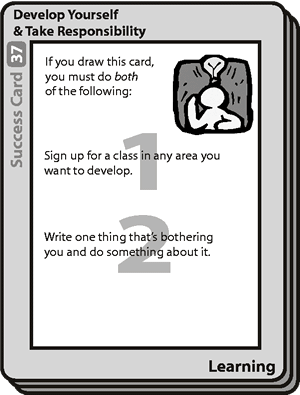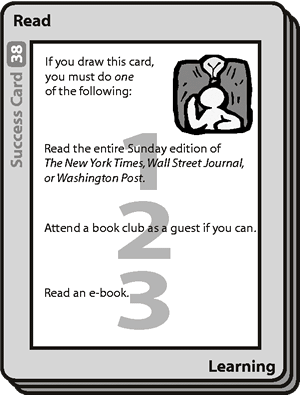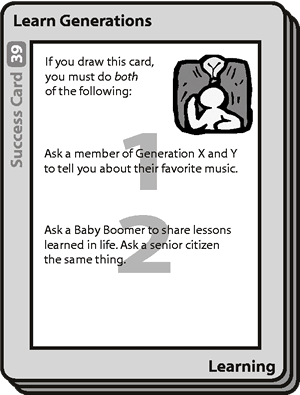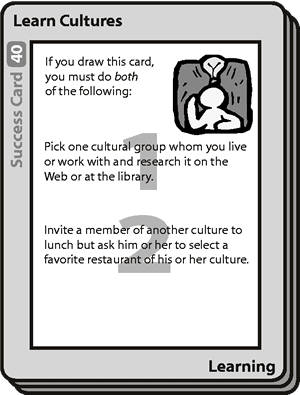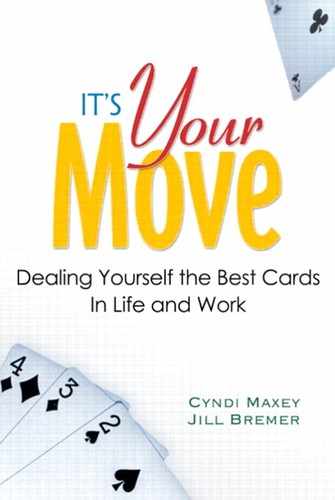Once a year, on one day between December 14 and January 5, thousands of volunteer bird lovers participate in the Annual Audubon Christmas bird count. With binoculars and notepads, they count all the birds that they see. This helps them learn about the birds' patterns of behavior, survival, and growth trends. They are enthusiastically committed to the count because they learn so much about creatures they love—even in the chill of the winter season. If you're ready to play the learning hand, it's time to get your own notepad, guidebook, and binoculars because, like these naturalists, you'll be gathering information to help you succeed in areas to which you're committed. Play your learning hand with a keen and constant sense of awareness. A winning player never stops learning.
In her first workforce address in 2001, U.S. Labor Secretary Elaine Chao described a transformed, information-based economy. Calling for better education, training, and career self-management, she asserted that the days of the gold-watch employees—the workers who spend a career with a single company—were over. Although you could be perfectly happy with your current company, it is a fact that workforce turnover averages between 23 percent and 28 percent, depending on whether you have a government job or a retail position. If you're currently not employed and want to be, this statistic can be refreshing as you search; chances are that a job you like will open at some point. At any rate, you're in charge of your career more than ever before.
How will you know what you need to learn and when? Awareness is the first step. Stop, look, and listen to your situation and your life. What do you need to learn this week, this month, and this year? Observe the wise learners who are all around you. You will see people such as Debbie, a desktop publisher, who takes the latest classes in computer visuals every year to stay on top of technology for her clients. Maureen, a former manufacturing administrative employee, is studying for her real estate license. Ann, an unemployed actress, is a catering intern at the restaurant where she has worked as a waitress for five years. Steve, who once owned a thriving dinner theater, is successfully redeveloping the contracting skills he learned years ago from his father. Jill, a former owner of a small electrical contracting company, is successfully applying her electrical background as a top sales representative in the competitive telecommunications industry. Learning is ongoing, life enhancing, and career building.
Awareness can come in an illuminating moment after months or even years of observation and experience. Your timing for the right move will appear. Consider the excitement that Michelle feels in the following unedited letter to her mentor as she shares her new career choice:
When you look at all of the exclamation points, you see Michelle's genuine happiness knowing that she is finally on the right path. Michelle did her homework to build her awareness. In the months before the letter, she frequently met her mentor at small networking groups. She also developed a good sense of what a corporate training career was like by holding entry-level positions in two different companies and attending meetings sponsored by the local training association. By the time Michelle wrote the email, she knew what she wanted. You, too, can build awareness by attending events, observing people, taking new positions, and volunteering for special projects.
Like Michelle and Anthony, you gain awareness over time. Practically, you can join groups, observe job postings, read reports, and listen to the water cooler chatter or the neighborhood buzz. You could hear a little voice in your head telling you what your next move should be. You also want to listen to your heart.
According to Robin, heart awareness gets beyond the ordinary, daily to-do list. It provides a broader focal point. It puts things in perspective. Your heart awareness can point you back to your family, your home, or a cause in which you believe. Take time to assess where you've been and where you're headed as you learn both head and heart awareness.
Asking for help is actually a sign of healthy self-esteem. If you seek help in the form of feedback, you become not only more aware but also more confident because you get answers and advice. People find you easier to work with because they learn that they can give you help in the form of constructive criticism without fear. Tell yourself that asking for help is a sign of strength, not weakness. People who help each other naturally feel more camaraderie. At work, you could find that comraderie pays off in company loyalty. A study by the Wharton School of the University of Pennsylvania showed that firms with high levels of closely connected employees are more inclined to retrain their employees rather than hire new ones. Why? With good teamwork, employees know what to ask each other and are aware of each other's strengths and challenges. Advertising agencies, medical offices, and construction companies are typical types of companies that rely heavily on this type of information sharing. It's clear that open, communicative relationships are valuable; they make it easier for your organization to keep you.
A women's publishing association conference featured a panel of female publishing executives. In the question-and-answer session afterward, the panel addressed many standard questions about how to get started in a publishing career. Then one young student asked, “Looking back, is there anything you would have done differently?” An officer of one of America's largest publishing houses answered first: “I would have asked more questions. I think at work people are afraid to ask questions, when, really, most of us are quite willing to answer. I would have asked, Why do you do it this way? Or Have you considered this? That's what I would have done differently.”
You could be a person who finds it difficult to ask for help. Think about what you fear about it. Is it appearing inferior or lacking in knowledge? If so, ask for something small first, for example, where something is located. Build gradually to more important questions. Perhaps you're a shy person who fears approaching people in the first place. Again, start by asking for the help of someone you know best. Every organization has people who naturally take others under their wing; choose one of those people first. Then be honest with yourself. Are you really asking people for help, or are you just going through the motions? Do you really listen when they give it? Are you willing to help them in return? Are you just making mindless small talk in the lunchroom every day? How can you become an integral part of the group? Don't you want to be the person whom the company retrains rather than outplaces? Every day, work to increase your chances of becoming an integral part of the team. It will pay off.
A common area in which people need help is technology. Even if your life involves limited technology, it's very important to be knowledgeable when you need to be. It's not even funny to say you're computer illiterate any more. No one is asking you to be a wizard, but your associates at least expect you to ask educated questions. It's the difference between asking frantically, How do you turn this darned thing on? and saying calmly, I'm not familiar with the power switch location on this model.
Catherine, a former radio personality turned business consultant, had used email at the radio station but had never needed to use a laptop. When she discovered that, as a consultant, she would have to use one, she was a little nervous. Every time she touched it, it appeared to her as if something too fast would happen and she would scream. It was hilarious to everyone who watched as well as to Catherine. Whenever something happened on the screen, she was surprised. She asked Bill, the computer guy, as she called him, for help. With a good sense of humor, Bill readjusted the computer so the touch pad wasn't quite so sensitive. She then realized that the technology problem she faced wasn't totally due to her lack of experience. Catherine now asserts that people come to her for help; in addition, she has learned how to use spreadsheets and technological tools that she never had to use before.
Rob and Catherine asked for help directly. If you're employed, it makes sense to ask the boss for 15 minutes of time to find out what you need to learn next. In addition to asking questions of your manager, friends, and co-workers, you can join a support group or take a class to develop your skills and abilities. The coaching field is growing fast; you can find a coach to help you in every major city in the United States. Search under coaching or coaching and training alliances on the Web. With a little experimentation, you will find the right fit for you.
French author and diarist Anais Nin wrote in Winter of Artifice, “Life is a process of becoming, a combination of states we have to go through. Where people fail is that they wish to elect a state and remain in it. This is a kind of death.”[1] If you feel stagnant in your life, you are probably ready to make a move. That move can involve a considerable amount of self-development.
If you're an older or experienced worker making a job change, you could find that your wisdom and experience are less important than the recent computer courses you've taken at a local college. Many interviewers will check your resume to see if you've gone back to school and if you're keeping up your knowledge with new skills. You could also want to apply for a bridge job: a part-time, short-term position that helps you move between one career and another or retirement. The Employee Benefit Research Institute estimates that between one-third and one-half of older full-time workers will hold a bridge job before finally quitting work. Older workers are seeing retirement as a process, not an event.
Whatever your age, if you want to be employed, you will find that self-development through formal education pays off. Lifetime earnings are far higher for college graduates. The Economic Policy Foundation in Washington, D.C., cites that a degree from a vocational or technical school can mean almost $1.5 million in earnings during a work lifetime compared to about $852,000.00 for a high school diploma. A bachelor's degree is worth more than $1.9 million over a lifetime. The average college graduate makes twice as much as a high school graduate. The impact of technical change and globalization has increased jobs in careers that require more education. If your employer doesn't provide assistance, investigate loans, grants, and scholarships. If you end up paying for education on your own, research www.irs.gov for information about federal tax credits such as the lifetime learning tax credit. Don't give up easily if you want formal education to be your next move.
Self-development is often challenging. It could become necessary when you weren't really planning to be re-educated. For example, after the September 11, 2001, attacks on the United States, many people were forced into developing new skills outside traditional classrooms. One in four workers in New York's Chinatown lost a job in the three months following the attacks. Chinese workers in the devastated New York garment district were signing on for beauty school while other people waited in the wings for the garment workers' spots if they decided to quit. The meeting and travel industries were greatly affected as were thousands of other workers in the New York area. All of those people had to make new moves. Many had to develop new skills.
Technology's volatility could also have affected you. You could be one of many who are stunned by rounds of layoffs in the aftermath of the dot-com crash and the weak economy. As you plan your next move, make a note that companies prefer people who are well rounded, able to work in teams, and communicate effectively. Although a few years ago you could have been hired based on your great technical skills, today you'll need to have evidence of your ability to communicate and adapt. You could feel as if you're stepping out of your comfort zone. Imagine how the Chinese garment workers felt while learning the art of the manicure!
A mother tells a favorite story about her son. Once, when he was eight, he got a letter in the mail, addressed to him personally in child's printing. Mysteriously, there was no return address. When he came home from school that day, he eagerly opened it because he didn't receive much mail. He read it out loud in his best second-grade style:
As she listened, the mom sighed, envisioning days of letter writing ahead of her, but at the same time her son shouted, “WOW! Can I do it, Mom? Huh? Huh?”
“Well, sure you can,” she answered. “But chain letters take a lot of time and work, Robbie. This will have to be your project—not mine!”
“That's O.K.,” her son responded. “I'll do it on my computer.”
He was learning keyboarding in second grade, and he ran to the family computer. Much later, he came back with five copies of the letter. Seeing his hard work, his mother suggested that he call a few friends to see who might like to receive a chain letter. First, he called his best friend, Jared, next door. She overheard him ask, “Hey do you want to be in a chain letter? Yeah, well you send it to five friends and you get all these postcards. . . . OK.” Click.
With disappointment he said, “Mom, Jared doesn't want to do it.”
She suggested that he call his cousin Leon in Pittsburgh.
“Hey, do you want to send a chain letter? Yeah, well, you send it to five friends and get postcards. . . . OK.” Click.
“Mom, Leon doesn't want to do it. Do you think the kids on the block might?”
She started to say yes when he yelled, ”Yeah!” and he was out the door with five letters in hand.
Very shortly, he returned with all but one letter delivered.
The mother was truly amazed. “Robbie, great job!” she said.
Nonchalantly, her son answered, “Yeah, Mom, everybody wanted to do it.”
She wondered what his technique was, but at that moment his friend Jason came over to play. Brightly, Robbie turned to Jason with the remaining letter in hand.
“Hey, Jason,” he asked, “Want to be a part of a world's record?”
Then the mother knew. Her eight-year-old salesman had changed his strategy. No longer was he even mentioning the chain letter. He knew his customer, all right. What child doesn't want to be a part of a world's record? He took responsibility for his success, and he repositioned the idea so he would achieve it.
Like Robbie, you too could have projects that don't go well at first. You could want to give up, but keep in mind that instead of giving up, you can just reposition. Sometimes you need to look at things from a different perspective. Robbie began to see his buyer's point of view more clearly with each failure. Repositioning an idea will often lead to success.
Robbie and Woodrow are both young entrepreneurs. They both took risks and followed their instincts to reach success. You don't have to start a company to learn how to work with people and figure out problems. A group of dentists in a large urban area has met every Friday for fifty-four years to schmooze, shop talk, and share opinions about difficult cases. They are single practitioners who enjoy the gatherings because they don't get out of the office much. The weekly get-togethers have been accredited as a form of ongoing education by their state's academy of general dentistry. Many current members are the children of original forum members.
If you want to change how you spend your time or your work, you can look closely at areas that have been hobbies or part-time jobs in the past. Maybe you used to ski, knit, bartend, or sing. Why were you attracted to these areas? How could you make the next move to include them more fully in your life? Chances are that something about that hobby or pastime fulfilled you; perhaps it heightened your self-esteem because it came easily and you did it well. Perhaps now is the time to develop it further.
Steven's experience illustrates what can happen when you take responsibility for your happiness. He was in an unhappy pattern; finally, he took advice, asked for a friend's help to fund his training, and is now following his passion for magic and motivation.
You can learn alot through daily life and volunteering. Karen, a stay-at-home mother of three boys, cochairs the school fund-raising auction. She develops her skills in managing people and territories, in presenting, and in making sales calls. Alex, a busy dad and graphics artist with an ad agency, designs the logo for the program book. He develops his listening skills as he works with Karen to get it right. Guy, a restaurant owner, writes the copy for the school newsletter. He develops his ability to write, edit, and meet deadlines. Michele, an interior designer, heads the site details and develops her negotiating skills with the suppliers and venue managers. Even a school auction can be a valuable training ground for responsible learning.
Few people read anything of worth once they graduate from high school. Reading can be the conduit, however, for countless ideas that propel you forward. Today, you can read online, via email, or on paper. Formats change as technology allows. E-books are growing slowly in popularity, roughly by 10 to 15 percent per year. Perhaps you're attracted to reading in this format. If you travel or like the technology, you could have found a great way to learn in your spare time. Especially popular with students and people who love handheld devices, dedicated reading devices allow you to download books over the telephone line. One company's best selling e-book is the international version of the Bible. Some publishers now provide complimentary e-book editions with their print titles.
In contrast to the high-tech format of the e-book is the growing popularity of the traditional, home-based, low-tech format of the book club. Ranging from free-for-alls that are open to anyone and any book to set groups with set books, a dues base, and a paid moderator, book clubs are growing rapidly. National news shows have focused on the phenomenon, and bookstores around the country cite statistics showing a 200 percent increase in the number of clubs. Often they give discounts to registered book club members. Members range from retired people to busy executives. Why such interest in reading? People say they want to use their minds again.
Originally designed to promote literacy, book clubs date back to seventeenth-century England and France. Benjamin Franklin organized a book group to encourage reading among his young apprentices in colonial Philadelphia. Many of these societies evolved into community activist groups that helped fund libraries, oust child labor, and promote women's suffrage. Great Books clubs, promoted by University of Chicago academics after World War II, are still alive in many schools, businesses, and libraries. One executive is reading Homer on the commute to and from his job as a Pfizer Inc. executive.
Parent-child discussion groups, such as the one Juana and her daughter found, are the most popular at many libraries. Reading formats are changing every day, but reading is still recommended as one of the easiest, least expensive ways to learn. A middle-age business owner talks about how his father, who is eighty-four now, was always an avid reader. Although his father was only a high school graduate, his son felt he was one of the most intelligent people around. His father would always come home from his factory job, do a few chores, and then read the paper. Later at night he read the Readers Digest and National Geographic. Another person remembers a great Aunt Sylvia who read political biographies and The New York Times and stayed sharp until age ninety-nine when she died.
Reading can be inspiring, stimulating, and incredibly relaxing. French lawyer and political philosopher Charles de Montesquieu once wrote that he had never known any distress that an hour's reading did not relieve. Read on!
Another important piece in the learning puzzle today is the opportunity to talk with and learn from the other generations in your life. For decades, Baby Boomers have dominated the demographic landscape. The Boomers, who grew up post-World War II in the late 1940s, 50s, and early 60s, set many standards due to their large numbers. Each generation has different attitudes about work and life. The wise learner considers these differences, which can be as simple as differing tastes in food, drink, or music or as complex as how they like to be rewarded for a job well done or how they approach project management.
Today's newest young adults, the Millennials–Generation Y, born between 1977 and 1994, are largely the offspring of the Baby Boomers and are set to take over as trendsetters and influencers. Generation Y is technologically precocious; they can't remember not having handheld phones and computers at home. They are highly adaptable and tend not to need the “high touch” that older generations do. They can take in lots of information and multitask easily. If you're in Generation Y, you can learn from older generations—even Generation Xers—about perseverance and etiquette. Generation Xers, who grew up in the 1980s, have been maligned for overfocusing on material goods and on six-figure salaries, but change, the dot-com crash, and the economy have sobered them. If you're a Generation X member, you can share your thoughts and feelings with the very different generations between which you're sandwiched.
If you're playing the Learning Hand today, you're playing it in the midst of all sorts of cultural diversity. Labor Secretary Chao cites a growing shortage of qualified workers and encourages us to move faster to introduce new populations and nontraditional employees into the workforce. What does that mean for you? If you are foreign born, you could need to quickly learn the culture into which you're assimilating. If you're working with people of more diverse cultures, you also need to learn about them to make your own life easier. Even if you're at home, you'll find that your school, church, and community are affected by growing numbers of people from around the world: Koreans, Poles, Vietnamese, Indians, Pakistanis, Chinese, Cubans, Mexicans—the list goes on. You're probably finding that other cultures offer a colorful mosaic to events and plans.
If you're lucky, your organization will help you learn about other cultures. As one example, America's Hispanic population jumped by 58 percent between 1990 and 2000. Hispanics will compose 22 percent of the U.S. workforce by 2010. To respond, a construction company in Des Moines, Iowa, is giving bonuses to employees who learn to speak basic Spanish on the job—but learning the language is only the beginning. It's also important to know that for Hispanics, family values are very important. Children are most important in their lives; extended family such as aunts, uncles, and grandparents also get great care. Hispanics need flexible hours to manage their personal lives. If you work with them or employ them, you need to understand their perspective.
The growing Hispanic culture is only one of many cultural groups about which to learn. Middle Eastern cultural influence is also spreading throughout the world. These groups have practices that are based on centuries of religious beliefs and traditions that transfer to work and all aspects of life. Middle Easterners express themselves differently and hold unique values in comparison to those with Western culture backgrounds. They are a wonderfully complex and historic group who are already influencing the Western workplace. European cultures are also constantly changing with the political and economic climate. Follow what's in the news in Europe to stay in tune with today's global climate.
In addition to learning about ethnic cultural diversity, you will also find it valuable to learn the organization's culture. This culture is often unspoken, as Don discovered in his experience with an airline and Tina learned with a government agency.
Both Tina and Don learned to listen to a new organizational culture and to ask questions to figure it out. As is true for all learning, they began with awareness, asked for help, took responsibility, researched and read, and continue to make moves for improvement. They admit they made mistakes. Learning any culture takes time and patient understanding. Learning in general isn't perfect. It's just another way to set yourself up for success.
The Learning Hand has been dealt. You've had a chance to think about all the ways you learn. Which self-developmental idea will propel you forward? To find out, play them all and compare results. Remember to write your choice in your game plan at the end of the book. When you've completed the move, return to the game plan to fill it in.


